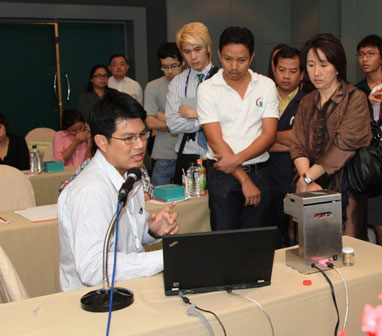Researchers at NANOTEC, King Mongkut’s Institute of Technology Ladkrabang (KMITL)(College of Nanotechnology), and Mahidol University have collaborated to develop an electronic nose (NanoNose) to help local food industry in areas related to standardizing smell, which is one of the key sensory perceptions for the food industry.
The Thai food industry is a multi billion dollar industry and account for 3% of the total world food export. The drawback of this industry is that it is prone to various sensitive aspects such as safety and quality.
“We utilized knowledge in areas related to surface analysis and nanaocoating to existing sensor technology to developed an electronic nose (NanoNose) which is a bio-mimetic device based on series of gas sensors to provide a quasi-quantitative measure of the signature of smell” said Rungroj Maolanon, a researcher at Nanomolecular Sensor Lab at NANOTEC and team member. “In a way similar to human nose, NanoNose allow analysis of the headspace (volatile compounds) generated by liquid, gaseous or solid samples”.
 |
| Rungroj Maolanon (seated) giving a talk on NanoNose technology to private sector groups. |
NanoNose provides a qualitative measure of smell and identifies samples through a learning process. It compares each fingerprint to known chemical substance patterns in a data library and either matches the fingerprint, or records the sample as a new pattern. The data analysis employed the Principal Component Analysis (PCA), which classify the data according the recognition pattern of sensor array. The electrical response of each sensor is generated by the replacement of absorbed oxygen molecules by exposed chemical vapors to induce free charge on metal oxide sensor surface.
From this research collaboration, different variation of NanoNose applications can be applied to agriculture, food science, health and environmental monitoring. The capability of the device to distinguish different types of smell has been demonstrated on fine scents such as perfume, alcoholic beverages, and coffee aroma. In the medical industry, breath analyses using NanoNose can be use to detect infections, gastrointestinal disorders and liver disease.
Fonte: Nanowerk
Fonte: Nanowerk
